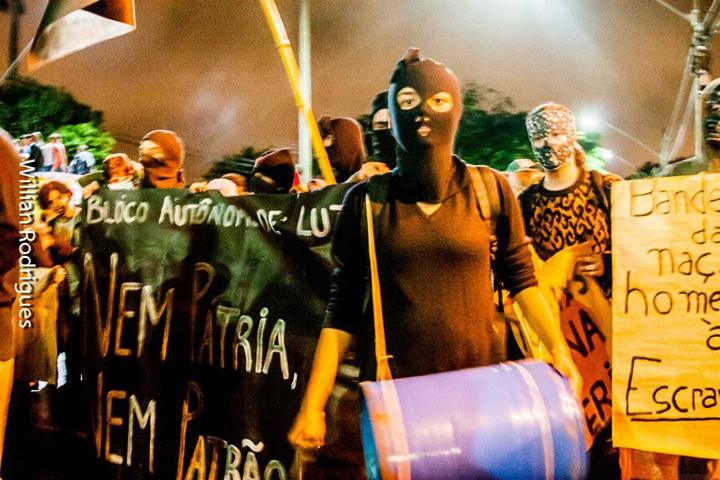Αναδημοσίευση από roarmag

Ενδιαφέρον κείμενο για την τρέχουσα συγκυρία στην Αίγυπτο:
Egypt’s revolutionary process is a complicated convolution of people power and military co-optation. To succeed, it will have to take on the army anew.
Now that President Morsi and the Muslim Brotherhood have been forced from power, one question appears to be burning on everyone’s lips: is this Egypt’s second revolution, or is it really just a coup d’étât? Anyone outside of Egypt who still pretends to have a straightforward answer to this question is either lying or deluding themselves. The truth is that periods of grave revolutionary upheaval never lend themselves to simplistic binary narratives. If anything, the answer is neither: this is neither a second revolution nor a coup d’étât. Why?
First of all, it’s not a second revolution because — as I pointed out at length in a recent essay — revolutions are not events but processes. In Egypt’s case, this process first revealed itself on January 25, 2011 and remains ongoing until today. For a major newspaper like The Guardian to write about “post-revolutionary” Egypt therefore seems bizarre; and note that The Guardian is far from alone in propagating this kind of widespread discourse. Indeed, the struggle for the soul of the Egyptian revolution only seems to have intensified over the past 2,5 years as various forces — the Muslim Brotherhood, the army, the US government — have sought to co-opt it.
Seen in this light, Egypt’s revolution has been marked by three main phases: the initial insurrection of January and February 2011 that toppled Mubarak; the second wave of protests that forced the Supreme Command of the Armed Forces (SCAF) to finally call elections; and now the third uprising of June 30 — the “Rebellion” — that forced Morsi out of office. It is absolutely crucial not to underestimate the role of popular agency in these world-historic events. As I wrote earlier, none of this would have been possible without the power of the street.
But there is a major caveat here. While the Egyptian revolution surely constitutes one of the most epic insurrectionary episodes in recent history, the “material constitution” of Egyptian society has changed remarkably little since the overthrow of Mubarak. When the people of Egypt initially rose up in January 2011, they rebelled against a deeply entrenched and profoundly repressive military dictatorship that had deprived them of “bread, freedom and social justice” for as long as most people could remember. The main slogan in the first wave of protests unsurprisingly became: الشعب يريد إسقاط النظام — the people demand the fall of the regime. Note the important point that the Arabic word for “regime” (nizam) is perhaps better translated as system, which indicates that this is not just about a specific group of privileged people but about a whole set of oppressive social structures. The people demand the downfall of this system.
In this sense, the system’s initial reaction was every bit as brutal as it was predictable: it simply tried to quash the revolt. But when it became self-evident that this approach wasn’t quite working, the true ruling class shifted strategies. The army’s top-brass recognized that to perpetuate its rule, or at least secure its economic interests and privileged political position, it would have to appease the masses. And so the military command, led by Field Marshal Mohamed Tantawi — Mubarak’s long-time Defense Minister and personal confidant, known in ruling circles as “Mubarak’s poodle” — simply turned on their former master and pushed him from power.
This led to the 15-month rule of the SCAF, which was supposed to be a transition period giving way to Egypt’s first democratic elections, but which was marked by continued mass mobilizations to save the revolution from the army’s incessant attempts to stall the revolutionary process and repress the ongoing protests. Belying its own pro-democratic rhetoric, the SCAF brutally cracked down on the protesters, killing hundreds and imprisoning, torturing and maiming thousands. During the second wave of revolt, as hundreds of thousands again amassed in Tahrir Square, the main slogan of the revolutionaries simply became: “down with military rule.”
By early 2012, the SCAF realized that its direct rule over society was badly affecting its carefully crafted mythology as a patriotic institution aligned with the goals of the revolution, potentially endangering its economic interests. At that point, it was happy to just leave politics behind and let some eager civilians take the blame. It was clear, however, that the only social force organized enough to take on such a responsibility was the Muslim Brotherhood. And so the army called elections, knowing full well that the Islamists would win, but recognizing just as well that it was in its own best interests to retreat to the wings and let elected politicians solve their mess. In fact, the army ascertained that the Brotherhood would win the elections, allowing its members to man the polling stations, count the ballots and beat up “troublemakers”.





